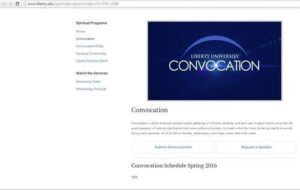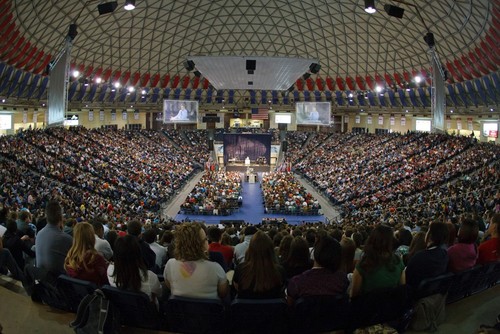The speaker lineup for Liberty University’s Convocation is, well, interesting. The list includes liberals, mystics, Roman Catholics, and….Trump. As a Liberty University student, I understand the stated rationale for these guests, but I believe there is a problem in offering these individuals a venue as notable as Liberty University with which to disseminate their views. Liberty University is an evangelical University and one of, if not the, largest Christian Universities in America. Being invited to speak at Liberty University could be viewed by some as lending a degree of credibility or acceptance of viewpoints that depart radically from a Christian worldview.
Liberty University defines convocation in the following way: “Convocation is North America’s largest weekly gathering of Christian students, and each year it plays host to more than 80 guest speakers of national significance from every sphere of society.”[1] Convocation at Liberty is not considered to be a chapel service, but simply a gathering of people. In reading through the FAQ section of the website, one will come across the question being addressed in this post, and in some that will follow:
Why does Liberty University invite guests that might differ from traditional Evangelical Christian viewpoints or even Liberty University’s doctrinal statement?
We believe “how you think” is just as vital as “what you think.” A fundamental part of the college experience is being exposed to a variety of viewpoints so that students can better understand why they hold their own beliefs and be better prepared to defend them.
As President Falwell has always said, “Students are not only free—but encouraged—to form their own opinions about what they hear in Convocation. This is a vital part of the higher learning experience”
We also believe that “how you disagree” is as vital as “why you disagree.” Learning how to disagree without being disrespectful is a vital tool for any world-changer who is truly more interested in winning people than winning an argument.[2]
I agree with this rationale, and college is definitely a place where a student’s thinking should be challenged. Student’s should learn how to think and formulate arguments as well as to be able to evaluate why they hold to certain presuppositions. However, is providing someone with whom we have fundamental disagreements with a platform necessary for this? I would answer no. In many of my classes, I have been challenged to read works that are opposed to my own worldview. I have been required to write book reviews where I have fundamental disagreements with the author. Liberty University has challenged my thinking…in the classroom. Our classes are the place where our thinking can be challenged and our arguments honed. Our stage should not be offered to those whose message is antithetical to orthodox Christianity.
On April 15 Liberty will have musician Matt Maher speaking at convocation. The problem is that Maher is a Roman Catholic. While Catholics do hold to some orthodox doctrines such as monotheism, the deity of Christ, the Trinity, they also deny justification by grace through faith alone and sola scriptura (although the list of infallibly interpreted verses in Roman Catholicism is notably short). They also require such things as belief in the Assumption, the infallibility of the Pope, and other damnable doctrines as necessary to one’s salvation. Christians and Catholics have a fundamental disagreement over the Gospel. Does Maher, a Roman Catholic, agree with these words from the Council of Trent:
“But neither is this to be asserted, that they who are truly justified must needs, without any doubting whatever, settle within themselves that they are justified, and that no one is absolved from sins and justified, but he that believes for certain that he is absolved and justified; and that absolution and justification are effected by this faith alone: as though whoso has not this belief, doubts of the promises of God, and of the efficacy of the death and resurrection of Christ.”[3]
“As regards those who, by sin, have fallen from the received grace of Justification, they may be again justified, when, God exciting them, through the sacrament of Penance they shall have attained to the recovery, by the merit of Christ, of the grace lost: for this manner of Justification is of the fallen the reparation: which the holy Fathers have aptly called a second plank after the shipwreck of grace lost.”[4]
Catholicism teaches that good works are necessary for salvation once a person has been baptized and had their original sin removed. Christianity teaches that a person is saved through repentance and faith in Christ. Good works are simply the evidence of one’s changed nature. Much more could be written on the problems with RCC theology, and I would direct individuals to James White’s The Roman Catholic Controversy for a good overview of the problems with Roman Catholicism or CARM’s Roman Catholicism section.[5]
Maher will stand on Liberty University’s stage and speak before a young and impressionable crowd. How many will see his presence at Liberty University as some sort of ecumenical outreach between Baptists and Catholics? How many will listen and then buy his music as a result of his appearance and thereby be constantly inundated with lyrics that are born from his Roman Catholic presuppositions? There will be those who will mock such a statement and feel this is an overreaction, yet here are Maher’s own words:
“The garage-turned-studio behind Maher’s home became a haven of reflection as he tirelessly transformed it into a creative songwriting space. “ Every day, I’d go out there and dream a bit and ask, ‘God, what do you want to build here?’” Maher recalls. “I thought a lot about the nature of what it means to build something, and I didn’t have a clear sense of where I was headed. I found myself in a place of unknowing,” Maher says. “So I naturally started gravitating toward writings and quotes from people having experienced the tension between certainty and mystery.” He began saving these prayers, quotes and excerpts while also studying prophetic voices who significantly impacted the history of the church – believers who wrestled with matters of faith, who challenged the status quo and left marked legacies…”[6]
This does not sound like the type of music a Christian University would want to appear to endorse. Maher seems like he may be a bit confused…he knows, but he doesn’t know, so he searches out “writings and quotes from people having experienced the tension between certainty and mystery” (read: mystics) and prophetic voices to help him understand the tension between certainty and mystery. Ok.
We also see the workings of a superficial, “mere Christianity” in Maher’s statement that he “has found that while we all come from different backgrounds, amass a range of experiences and even harbor conflicting opinions, the one thing that always binds us together is our humanity.”[7] The statement has a new agey, mere Christianity feel to it. Such a statement, however, is indicative of problems within the evangelical world. Justification is an essential doctrine and is not something we can simply jettison in the name of some superficial unity. Doctrine does divide–the sheep from the goats. Inviting a goat to speak to the sheep is not something Liberty University should be in the habit of doing.
- http://www.liberty.edu/spiritualprograms/index.cfm?PID=2586 ↑
- http://www.liberty.edu/spiritualprograms/index.cfm?PID=32826 ↑
- Council of Trent, Session VI, 13 January 1547, On Justification, ch. 6, http://www.thecounciloftrent.com/ch6.htm. ↑
- Ibid., ch 14. ↑
- https://carm.org/roman-catholicism ↑
- http://www.mattmahermusic.com/matt ↑
- http://www.mattmahermusic.com/matt ↑
**** UPDATE 01/12/2016****
Perusing Facebook and Twitter today, I stumbled across an interesting Twitter post by Matt Estes regarding the deletion of Liberty University’s Spring Convocation schedule. He had been following Liberty U’s Instagram and noticed it was deleted. I then visited Liberty U’s Convocation page and noticed that the lineup had changed to “TBA”. One of the anon trolls who normally contributes nothing to the discussion of P&P had noted that we would soon post a blog taking credit for the deletion. Sorry to disappoint you Mr. Troll, but I wrote the article on January 7 regarding Liberty University’s Convocation lineup. I highly doubt my one post was that powerful; I’m not that good of a writer.
However, I did reference the Spring Convocation lineup page in my original post and the page has now changed. The lineup for Spring 2016 has been removed, but you can see the intended guest list by following the link to Matt Estes’ Twitter page. At the present time, it is unknown why Liberty has removed the schedule. One can only hope that enough students expressed concern and Liberty decided to rethink inviting certain individuals.

[Guest Post by Chad Ressler]











